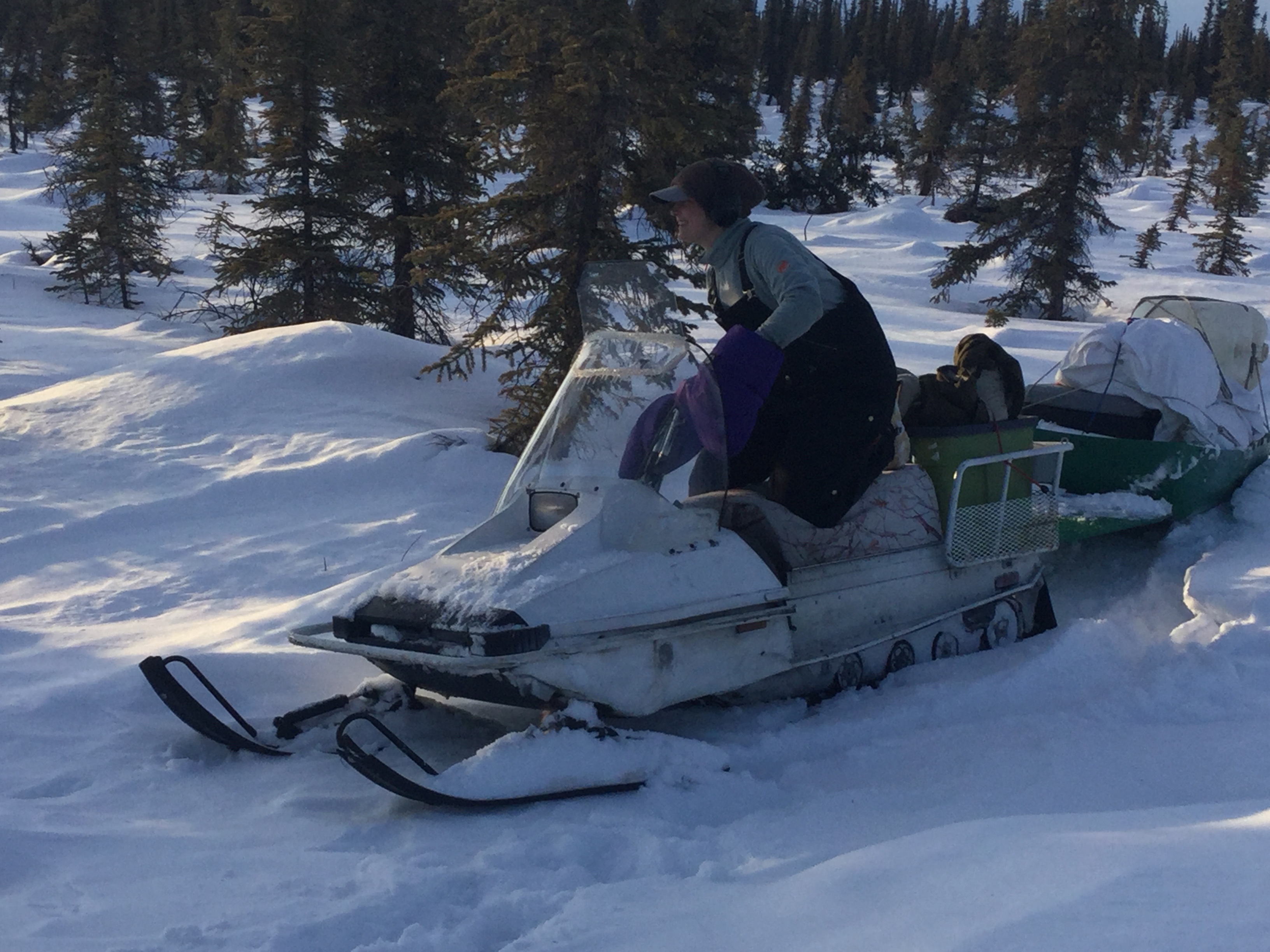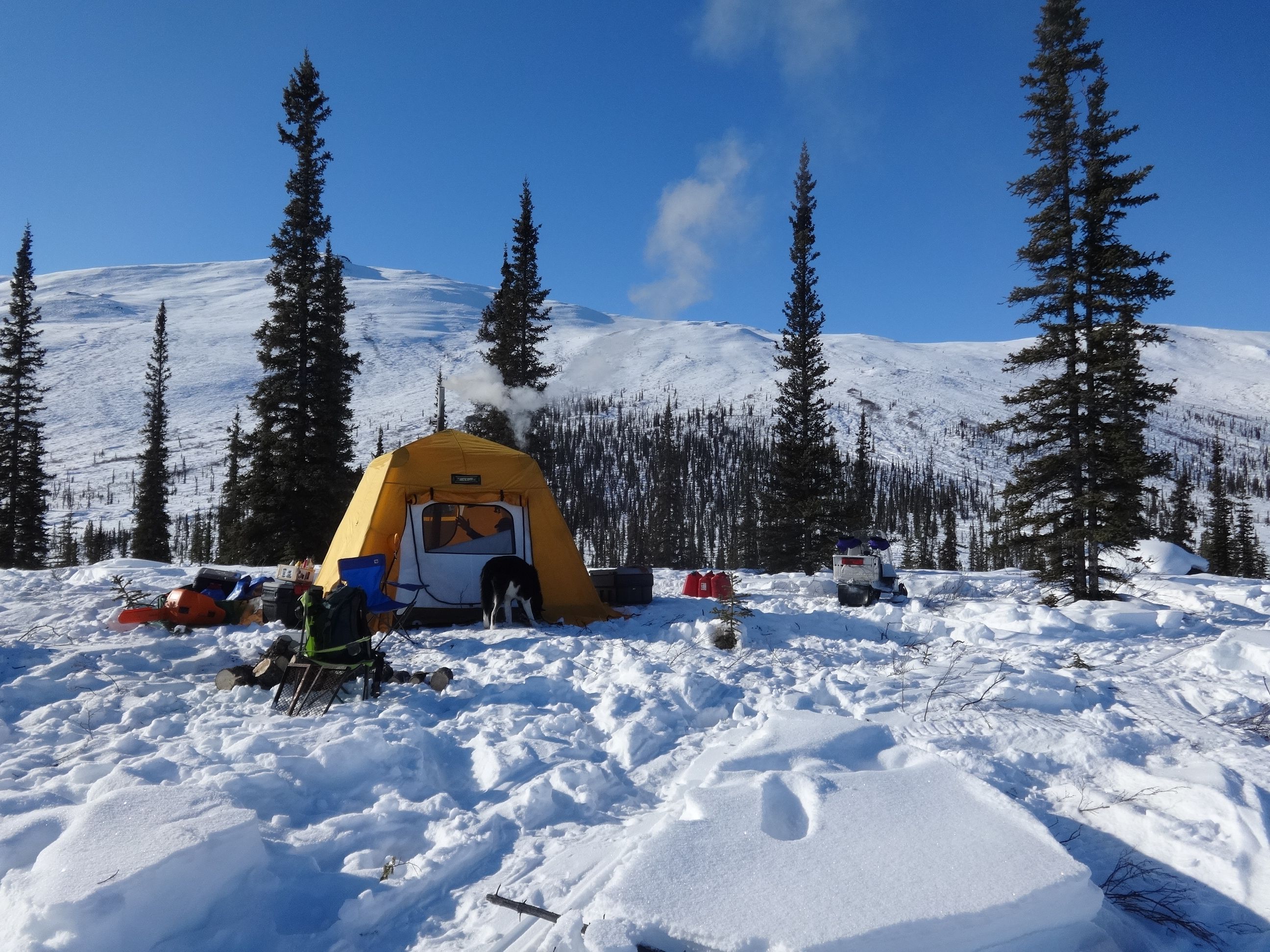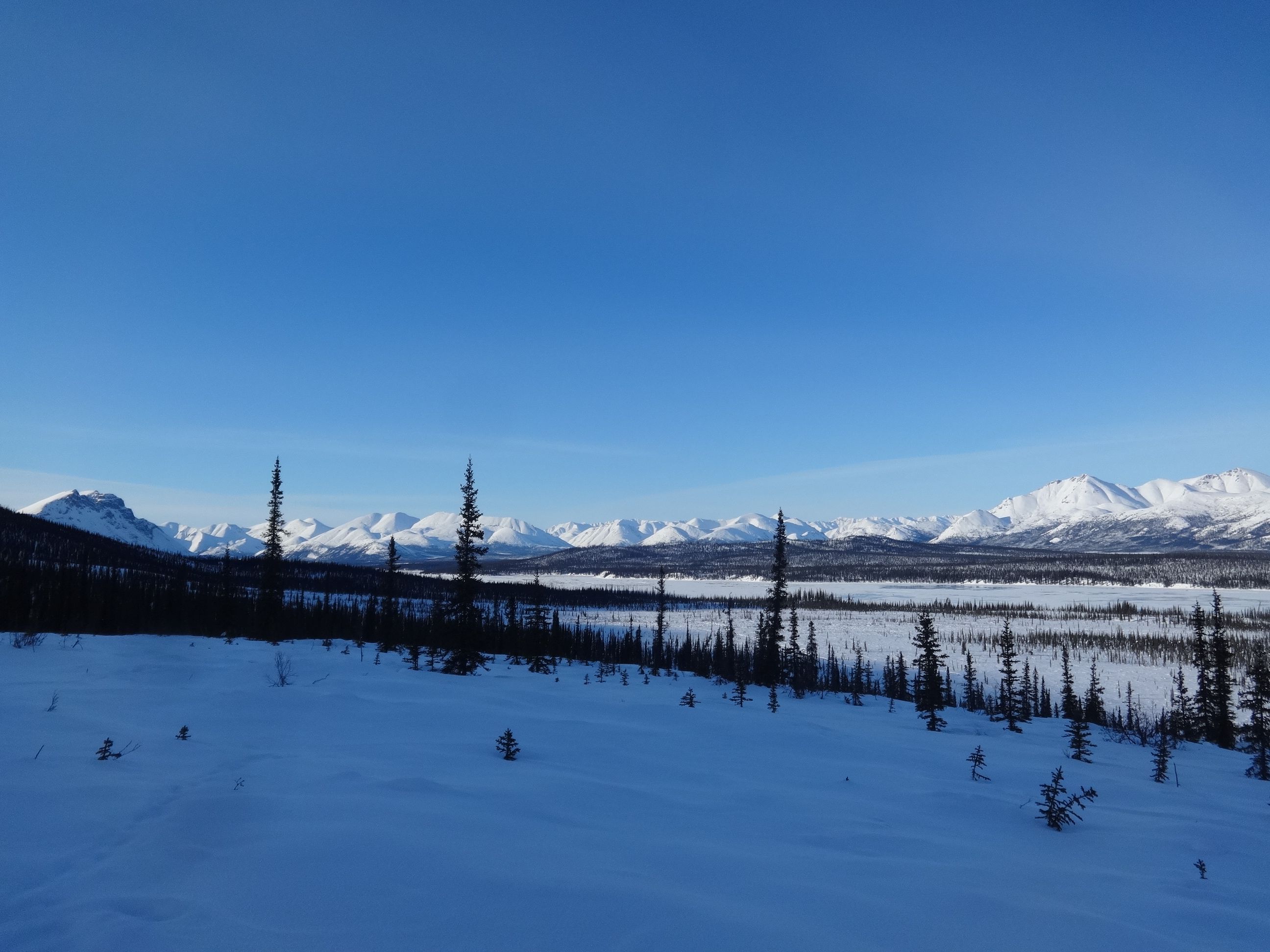It was twenty-below or so when we rode out from camp, and the ride was smooth. Geoff broke trail ahead of me, the Skandic plowing up a bank on either side of the trench it cleared in the tundra snow. The sun still hasn’t come up since November, but we’re getting alpenglow that creeps a little farther down the slopes each day, and the cold blue light that filters over the ridgeline to the south lasts a few hours. We headed north toward the mountains, breaking the trail that we hope will take us up toward the divide.
When we reached the river, I decided to take Daazhraii and turn back to camp. I didn’t want to push the dog too hard – large as he is, he swims in the mire of a fresh trail – or be out after full dark. It was only a few miles of backtracking, and Geoff planned to be right behind me after pushing the trail a few miles more across the Chandalar, so I wasn’t worried about riding alone.
I turned and took a long detour through the extra-thick buttercream tundra just to revel in the way the Bravo seems to lift up and ride on plane like a flat-bottomed skiff. The dog bounded behind, wallowing a little in the deep powder, but grinning and glad. It was just after that, maybe only two miles from camp, that my sno-go came to a halt, headlight dimming and then dying, the insulation of the engine’s roaring suddenly vanishing, so that I became, all at once, a part of the landscape rather than a traveler just moving through.
I tried to start the Bravo – no dice – then lifted the cowling. The spark plug boot had popped off, taking with it the little nut that screws onto the plug itself. It was wedged up inside the plastic cap that connects to the wire.
Shit.
No Geoff, so no tools.
Oops.
I know I should carry some basics, but I don’t. This situation is so improbable: Geoff is always with me, fully-loaded down with probably fifty pounds of good stainless steel, and, when he’s not, we carry a pair of UHF radios.
I pictured the second yellow hand-held, tucked under feet of snow blanketing the riverbank just south of Chandalar lake where we left it in an airhead moment on a packrafting adventure this summer.
Shit.
Dismounts are not elegant in full winter outerwear. I plunked into the deep snow beside the trail and opened the seat compartment of my Bravo: plastic bags, spare spark plugs, no tape, no tools at all, not even the scrench that had been in there for weeks. Definitely no needle-nosed pliers, which is what I really needed. What did I have? My emergency box, behind the seat, was full of dry clothes and firestarter. Not so useful. In my pockets I carried a lighter, some hand warmers, a headlamp and a knife. Bust.
I waded off through the deep snow to the lake’s edge where a few dead trees stood bare and raggedy. My feet were cold already, even in my bunny boots, and I needed to keep busy and warm if I was going to have to wait for Geoff to show up. I broke off low, dead branches and kicked down a few scraggly dry spruces. Winter outerwear is like chain mail: you can just throw yourself at a tree, or half-climb it and try to pull it down on top of you without worrying too much about taking a branch to the ribs in any serious way. The small branches burned quickly, so I had to keep at it. I hung my neckwarmer and hat by the fire to thaw out while I worked to gather more fuel. The moisture of your breath condenses on your outerwear in the cold, so you wind up with ice buildup, which eventually gets uncomfortable.
As I was dragging an armload of twigs back to my fire, something clicked in my brain: sparkplugs. I hustled back to where the Bravo waited, open like a clamshell in the trail, and tried unscrewing the nut from one of my spare plugs so that I could use the plug itself as a tool to remove the jammed nut from the rubber boot. Gloves on, I couldn’t loosen it. I tried taking my glove off and got nothing but a cold-scalded hand for my trouble.
Frick.
I gave up and went back to trudging heavily through the sometimes thigh-deep snow on the perimeter of the lake, wishing for snowshoes and gathering fuel while I waited for Geoff to turn back around.
When I got cold, I’d squat in the snow by the fire, then get up again to gather more fuel when the fire burned too low.
For two hours, maybe, I fed the fire, waiting. He didn’t appear. I did jumping jacks and added a bit of wood.
Night began to fall from the north and there was no sign of a headlight in the distance, no whine of an engine.
In the near-dark, I reevaluated my assets. I thawed the ice out of the elastic band on my headlamp, thinking maybe I could use it to clamp the rubber spark-plug boot to the engine and hold the nut in place long enough to make the short ride back to camp. Failing that, I could start walking. It wasn’t far, but the trail still hadn’t set, so it would be slow, difficult going, like wading in the surf, and I didn’t want to have to come back for the Bravo later. I took the spare spark plug out of my pocket and heated it, too, thinking maybe if I warmed it up the nut would come loose.
Not wanting a tongue-to-the-flagpole incident, I waited until the spark plug was really warm before sticking it in my mouth, then gripped the nut between my back teeth. I turned, and it came loose.
Just like that, I was back in business.
I screwed the spare plug into the nut jammed in the cap, popped out the nut, returned it to its rightful bolt and fired up the bravo.
Just like that.
While the Bravo muttered and churred in the trail, warming up, I threw the last of my wood on the fire. I was hoping it would burn long enough for Geoff to see it and realize what I’d pulled off all on my own. Night came as I drove away, turning my head to watch the live blaze of my campfire recede into the darkness.
(Geoff arrived at camp thirty minutes after I did, rimed with frost. He’d broken trail almost to the mountains, maybe another ten miles, and gotten stuck for a while in overflow.)













